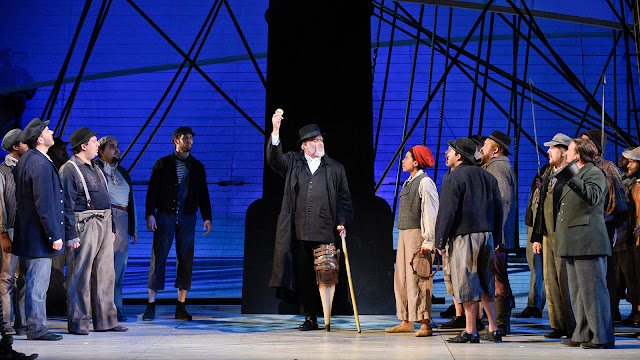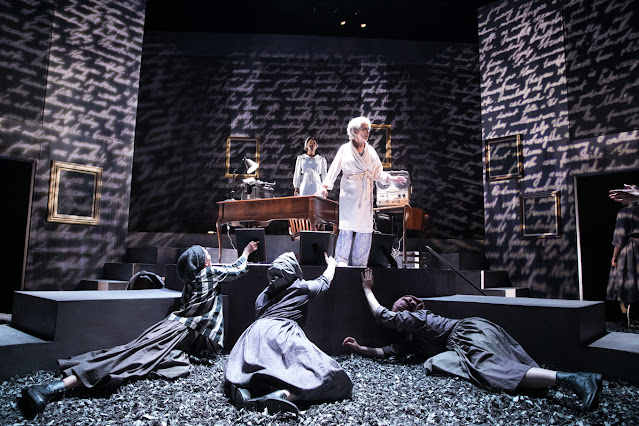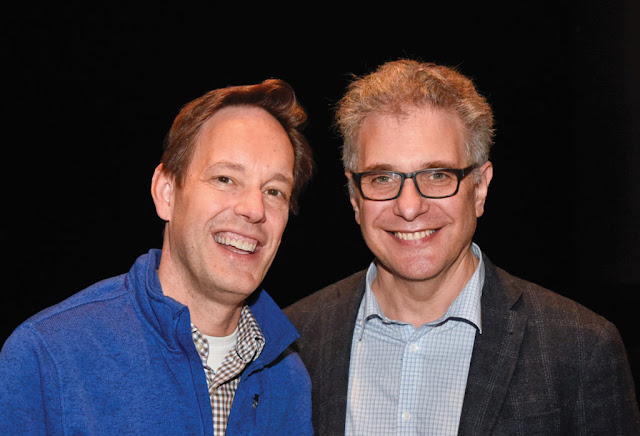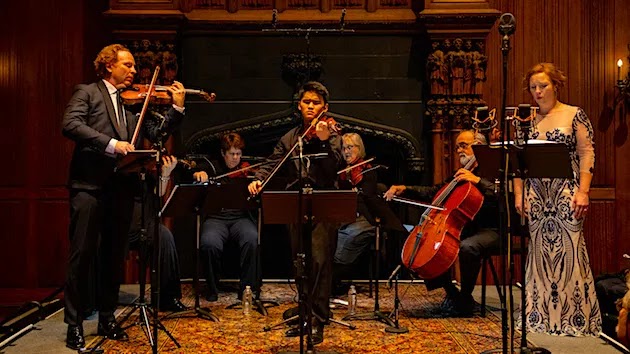 |
| Jake Heggie (Photo: James Niebuhr) |
Jake Heggie‘s song cycle for soprano, violin and string quartet, Intonations: Songs from the Violins of Hope is receiving its UK premiere at violinist Madeleine Mitchell‘s The Red Violin Festival which takes place in Leeds from 17 to 19 October 2024, where Intonations will be performed by mezzo-soprano Siân Griffiths, violinists Chloe Hanslip and Hong Chow, with Madeleine Mitchell leading the London Chamber Ensemble. I recently chatted to Jake to find out more about the work’s inspiration in The Violins of Hopeproject and how the work links to a group of other works inspired by stories arising from the Holocaust.
Intonations was commissioned by Music at Kohl Mansion, a performing arts series South of San Francisco. He explains how he was originally contacted in 2017 by Patricia Moy, artistic director of the performing arts series, as she was arranging to bring The Violins of Hope to the West Coast of America for the first time. She wanted a new work featuring the violins themselves.
The Violins of Hope project presents instruments that were owned by Jewish musicians before and during the Holocaust, representing strength and optimism for the future during mankind’s darkest hour. They have been refurbished by luthiers Amnon and Avshalom Weinstein, founders of The Violins of Hope. Until Patricia Moy contacted him, Jake had never heard of The Violins of Hope before and found it an astounding story. The question was, how to write a piece that featured the instruments and shared their resonance. The request had been for a chamber work, but Jake felt he does song and story-telling best. He asked whether he could write a song cycle and he approached Gene Scheer, who has written the texts for several works for Jake including the opera Moby Dick.
 |
| Jake Heggie’s Moby Dick at Dallas Opera where it premiered in 2010 (Photo: Dallas Opera) |
The idea was to have the violins played by contemporary musicians, with a solo violinist as their voice and a singer to embody them, their history and their stories. Jake and Gene Scheer mined James Grymes‘ book Violins of Hope: Violins of the Holocaust – Instruments of Hope and Liberation in Mankind’s Darkest Hour and narrowed down the harrowing stories to those that referred to violins in the collection.
The work was premiered by mezzo-soprano Sasha Cooke, violinist Daniel Hope, a quartet from the San Francisco Opera Orchestra and youth violinist Sean Mori. Jake describes them all as story-tellers and feels that the performance became a community project. It was also a very unusual project, and he feels he will not have the chance to do a similar one again. As a result of people hearing the work, he was invited to create an orchestral version for a festival on the West Coast. Intonations now exists in three versions, the original, one for orchestra and one for string orchestra. In a sense, this was a pragmatic decision as Jake wanted to make the piece as performable as possible. Whichever version you perform, the core of the piece remains the same. Whilst he prefers the intimacy and story-telling of the original version, he finds the full orchestral version thrilling.
In opera, Jake and his librettist need to create a dramatic arc which has to be sustained over hours, characters have to be developed, action and confrontation are needed. But though Gene Scheer, who wrote the text for Intonations, also writes opera libretti for Jake, their approach in a song cycle is different, it requires a different mindset. Jake points out that a song cycle can be introspective and very still, you don’t have to have action and confrontation. It is a different kind of writing for the music and the text, though he looks to connect the songs into a journey, but this might be referencing something that has happened or is going to happen. A song cycle can simply be in the moment in a way that would be boring in opera or theatre.
Jake comments that what he loves about writing songs is that you can set both lyrics and poetry. With lyrics, you have a text that demands music, whereas poetry does not need music so is far more nervy to set. Yet the partnership of music and poetry can be both challenging and rewarding. Generally with a new piece, he is working with lyrics but he sets poetry by great writers such as Margaret Atwood (Jake’s 2020 cycle, Songs for Murdered Sisters sets Atwood’s poetry specially written for the cycle). With lyrics, you can request changes so that the text develops alongside the music.
He has worked extensively with Gene Scheer and when writing a big piece, Jake trusts him and as they know each other they have a sort of unspoken language. But also, they challenge each other to do better work. The librettist’s role is to inspire the music, and Gene Scheer knows how to write what inspires him. These sorts of people do not come along every day.
Jake always wanted to write songs and started doing so when he was around eleven. This was when his father committed suicide after a long battle with depression, and Jake found a home, a community and safety in music. He did not know opera but loved musicals and these were readily available. He was swept away by storytelling in music and was drawn to a singer telling a story whether the music was a pop song, a jazz standard or musical theatre. In his late teens, he started to learn about song cycles and art songs. After graduating from high school, he spent two years studying at the American University in Paris and there he immersed himself in music and opera so that every day was a revelation. At a music appreciation class, the lecturer played the Presentation of the Rose from Strauss’ Der Rosenkavalier. Jake had not heard it before and burst into tears; as a result, the lecturer guided him towards all the live music available in Paris at the time.
Returning to Los Angeles, in quick succession he saw Britten’s Peter Grimes with Jon Vickers in the title role, and Sondheim’s Sweeney Todd with Angela Lansbury and George Hearne. Both, in different ways, floored him and he thought that this was what he wanted to do with his writing. The combination of great singers and great repertoire inspired him; he would get to know singers and composers including Stephen Sondheim, he met Bernstein a few times and the composer Ned Rorem was encouraging.
Earlier this year, Jake had the premiere of another Holocaust-related work, his opera Before It All Goes Dark with a libretto by Gene Scheer. This was inspired by the true story of a gravely ill and deeply troubled Vietnam War veteran who learns that he was heir to a priceless art collection stolen by the Nazis. In fact, this is the latest in a sequence of works commissioned from Jake by the Seattle-based Music of Remembrance, an organisation devoted to the music of composers silenced by the Holocaust.
Music of Remembrance first contacted Jake about a work related to the persecution of homosexuals. At the time, Jake could not find a lot of information and was drawn to the documentary Paragraph 175, directed by Rob Epstein and Jeffrey Friedman, which features interviews with survivors of the Nazi persecution of homosexuals because of the German Penal Code of 1871, Paragraph 175. Jake’s piece, For a Look or a Touch was premiered in 2007, then Music of Remembrance’s artistic director, Mina Miller invited Jake to create a stage work based on the life of the Polish dissident and Holocaust survivor Krystyna Zywulska (1918-1992), the one-act opera Another Sunrise. There then followed a song cycle based on Zywulska’s lyrics, written while she was a prisoner in Auschwitz as a way to survive the brutality of her life there. This was Farewell, Auschwitz (2013), using Zywulska’s Polish lyrics in free, poetic translations by Gene Scheer. Finally, they created an opera, Two Remain which encompassed Another Sunrise, the songs of Farewell, Auschwitz and For a Look or a Touch. This premiered as Out of Darkness in 2016 but was substantially revised as Two Remain which premiered in 2018.
 |
| Jake Heggie: Out of Darkness: Two Remain, the Atlanta Opera, 2018 (Photo courtesy of The Atlanta Opera) |
Along with For a Look or a Touch, the result was a remarkable sequence of five big pieces for Music of Remembrance, and Jake felt that Patricia Moy’s invitation to write a work for The Violins of Hope presented another perspective on the same story. After the humans are gone, the instruments still sing and it is important to listen to them. Jake comments that we still live in challenging times, but through music and story-telling we can make connections, we do what we can. This sense of connection between performer and audience is important to Jake, the telling of these important stories compels him to work hard.
He writes by hand, pencil on manuscript paper, with a copyist with whom he has worked for 25 years. He likes the sense of connection, describing himself as old school, and points out that whilst some of his students prefer using a computer because it is faster, he has managed to write ten operas and all those song cycles and much else besides. He feels that working by hand makes you feel invested in a work, it allows you to make a mess and then find your way out. He warns his students about simply entering music onto the computer and it simply sounding good. It isn’t finished, now is the time to work on it. He uses the analogy of needing to apologise to your mother, you could send a text or write an email, but choosing a pen and a card and writing her a note shows that you are really invested in it.
Looking ahead, he has just finished orchestrating a big piece which is being premiered in December by Fort Worth Symphony Orchestra, conducted by Robert Spano, Earth 2.0. This sets a text by Anita Amirrezvani and features countertenor Key’mon Murrah with dancers from the New York-based dance troupe Urban Bush Women. This explores the problems of climate change from the point of view of Earth personalised as a character on stage, considering the end of a bad relationship. Further ahead, he is setting more Margaret Atwood (this time pre-existing poems) for a work to be premiered at Carnegie Hall and will be collaborating with the performance artist Taylor Mac.
 |
| Jake Heggie & Gene Scheer |
Also to look forward to is the first performance of his opera Moby Dick at the Met in New York in March 2025, conducted by Karen Kamensek, directed by Leonard Foglia with Brandon Jovanovich, Stephen Costello, Peter Mattei, Ryan Speedo Green, Janai Brugger, Malcolm MacKenzie, William Burden. Whilst his Margaret Attwood settings, Songs for Murdered Sisters is being conducted by Yannick Nézet-Séguin with the Philadelphia Orchestra and baritone Joshua Hopkins in January 2025.
The Violins of Hope – Jake Heggie, Herbert Howells, Vaughan Williams – Siân Griffiths, Chloe Hanslip, Hong Chow, Madeleine Mitchell, London Chamber Ensemble – The Red Violin Festival, Leeds Conservatoire, 17 October 2024 – further details
The blog is free, but I’d be delighted if you were to show your appreciation by buying me a coffee.
Elsewhere on this blog
- Innate theatricality: composer Adrian Sutton definitively moves out of the theatre with a challenging yet engaging concerto for violinist Fenella Humphreys – record review
- Eternity In An Hour: Keval Shah and Jess Dandy on their unique reimagining of the Bhagavad Gita – feature
- A focus on the flute: London Handel Players in a group of cantatas Bach wrote in 1724 with virtuoso flute parts – concert review
- A special treat: strong individual performances & superb ensemble in WNO’s revival of Puccini’s Il trittico – opera review
- Embodied sound: Zubin Kanga on his innovative approach to new technology through his interdisciplinary musical programmes – interview
- Compelling performances: Stephen Hough, YL Male Voice Choir, Santtu-Matias Rouvali and the Philharmonia – concert review
- Investing in the magic of Purcell’s music: The Fairy Queen from The Sixteen at Cadogan Hall – opera review
- High-quality music-making & imaginative programming in the special natural setting of Exmoor & Dartmoor: I chat to Tamsin Waley-Cohen of the Two Moors Festival – interview
- A superb sense of community: Mascagni’s Cavalleria Rusticana at Blackheath Halls Opera – opera review
- Remembrance and renewal: Peter Seabourne’s My Song in October – record review
- Home












